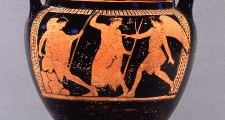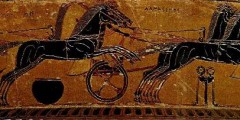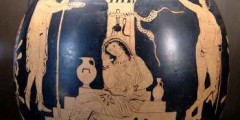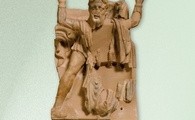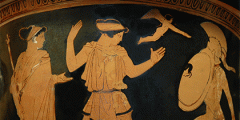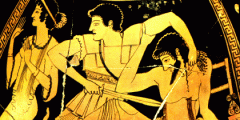Thoughts of a serial translator
April 10, 2013
Here … is the text of the plenary lecture I gave at the annual conference of the Classical Association at Reading last Wednesday. Next year’s conference is in Nottingham. It will be a bit later in April, and we hope the weather will be better! Alan Sommerstein
Furies travelling light
March 6, 2013
One doesn’t normally think of ancient Greek women (at least if they were of respectable status), let alone goddesses, as showing more than half a leg in public, but here is a goddess doing just that – and what is more, if you believe Apollo (and Apollo, if you believe Apollo, never lies), she is …
Multiple champion “killed” in racing tragedy
January 31, 2013
As this is National Storytelling Week, I thought I’d put up my favourite piece of storytelling from ancient drama – an early classic of sports reporting, from Sophocles’ Electra. The old slave-tutor of Prince Orestes of Argos has come to bring some very sad news to his master’s mother. “He went to the famous competitive …
Comedy Jones? HMS Tragedy??
January 16, 2013
Would you call your son or daughter Comedy? At least two Greek parents did, more or less, in the fourth century BC. Inscriptions tell us of a sculptor working at Epidaurus, named Komoidion, and a woman in the perfume business at Delos named Komoidia. No one (that we know of) named their child Tragedy. But that …
The biggest mouth (2)
January 10, 2013
Last week, I asked: “In the 33 plays by (or attributed to) Aeschylus, Sophocles and Euripides that survive in full, which individual character has the most to say?” No calculation of this kind can be exact. Texts are often uncertain, lines are of different lengths and their attribution to speakers sometimes disputed, and so on. But …
The biggest mouth
January 3, 2013
Here’s a question for you to get your teeth into. In the 33 plays by (or attributed to) Aeschylus, Sophocles and Euripides that survive in full, which individual character has the most to say? This excludes generic character-designations like “Servant” and “Messenger”; and you’ll need to take care to distinguish between different characters of the same …
What goes wrong in Euripides’ Bacchae?
November 1, 2012
In Euripides’ tragedy The Bacchae, the god Dionysus brings terrible suffering on Thebes, the city of his birth, and on all the surviving relatives of his mother Semele. All the women of Thebes become possessed and flee to the mountains to perform orgiastic rituals in honour of Dionysus, led by Semele’s three sisters Agaue, Ino …
A new guide to Sophocles
October 25, 2012
Nottingham classicists have contributed three chapters to the new Brill’s Companion to Sophocles edited by Andreas Markantonatos – more than any other institution in the world. In this volume, which covers all aspects of Sophocles’ dramas and their reception, Patrick Finglass writes on Sophocles’ Ajax (which he edited for Cambridge University Press last year), Alan Sommerstein on …
Two productions next year
October 12, 2012
Spring 2013 will be Greek drama time in Nottingham! Two productions, a comedy and a tragedy, and both on the theme of the miseries of war. In April, the University’s own Lakeside Arts Centre will stage Aristophanes’ comedy Lysistrata, in which the women of Greece, by withdrawing their sexual services, compel their menfolk to stop fighting …
Thoughts about Aeschylus’ Oresteia
October 11, 2012
Alan Sommerstein reflects on some issues raised in Aeschylus’ Oresteia trilogy which are as vital now as they were in 458 BC when it was first produced. This post originally appeared in the “Writer’s Choice” series on the blog of Prof. Norman Geras (www.normblog.typepad.com). Grateful thanks to Prof. Geras for permitting it to be …


